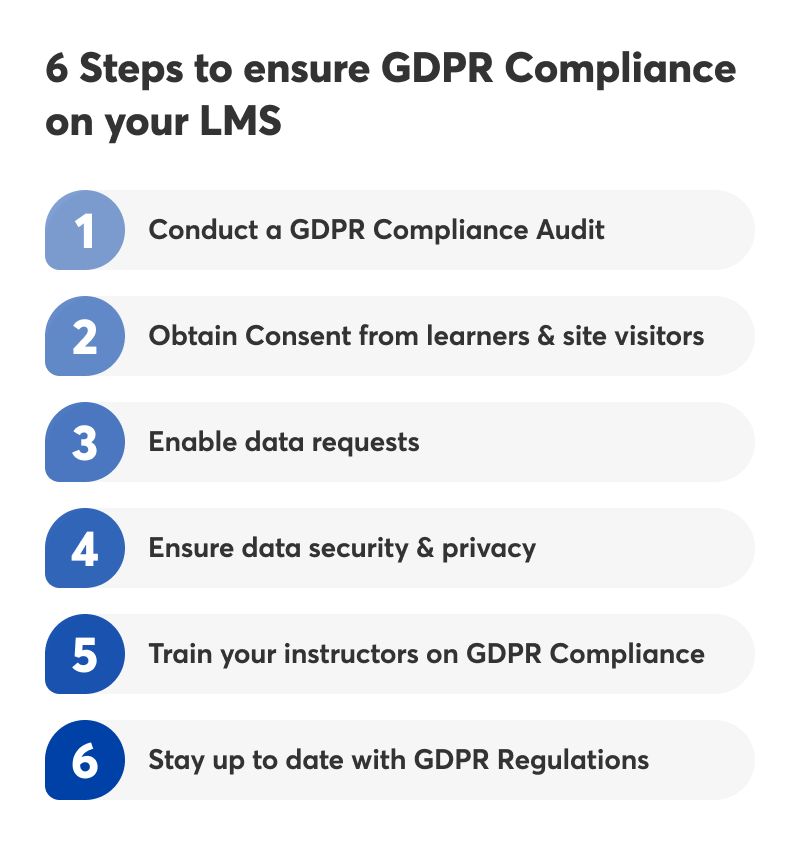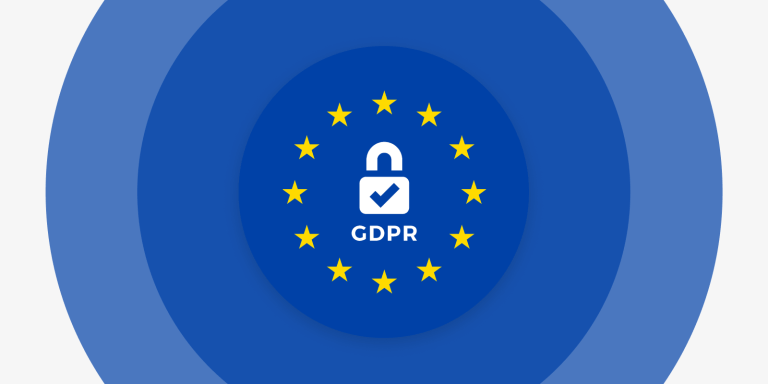Table of Contents
In a world where data privacy is becoming increasingly important, GDPR arrived like a knight in shining armor in May of 2018, providing much-needed peace of mind to people concerned about their personal information.
However, this also meant a significant project for business owners and organizations who had to ensure compliance with the new regulations. If you’re starting an online course business, understanding and complying with GDPR regulations is essential.
But with so many complexities and technicalities involved, it can be overwhelming to navigate GDPR compliance on your own. That’s where we come in!
In this post, we’ll break down everything in simple terms, explaining what GDPR is and how it affects online businesses.
We’ll also discuss how your LMS settings can help you achieve compliance and provide an overview of relevant LearnWorlds features – the top GDPR-compliant platform with a complete set of features that satisfy GDPR requirements.
So, read on to master GDPR compliance and ensure your learners’ data privacy!
Table of contents
Overview of GDPR regulations
The General Data Protection Regulation (GDPR) is a regulation that aims to protect the personal data and privacy of EU citizens by regulating the way personal data is collected, stored, used, and shared. GDPR affects all organizations operating in the EU, regardless of where they’re based.
Since May 2018, when GDPR was implemented, organizations must obtain explicit consent from individuals before collecting and using their data, clearly explaining why they need the data and how they will use it. Individuals maintain the right to access, modify, or delete their data at any time.
GDPR also mandates that organizations should take precautionary measures (‘By default” and “By design”) to protect personal data.
For especially severe GDPR violations, listed in Art. 83(5) GDPR, the fine framework can be up to 20 million euros, or in the case of an undertaking, up to 4% of their total global turnover of the preceding fiscal year, whichever is higher.
How Does GDPR Apply to eLearning Platforms?
eLearning platforms collect and process large amounts of personal data, such as name, email address, date of birth, credit card numbers, social media profiles, IP address, and more.
Therefore, GDPR affects your online course business the same way it affects any other business processing data of EU citizens.
And although you don’t have to implement advanced security measures like hiring a Data Protection Officer, you must surely do the following:
💡 Keep reading as we’ll give you more specific examples in the next section!
6 Steps to Ensure GDPR Compliance on Your Learning Management System
Let’s see 6 easy steps you can take to ensure that your online course business is GDPR-compliant:

1. Conduct a GDPR compliance audit
Conduct a GDPR compliance audit to understand whether you’re in standing and identify vulnerabilities in your security measures. As part of your audit, you should check the following:
Personal data
What types of personal data do you collect? And is all this data necessary for your business operations? According to GDPR, organizations should collect only data that is necessary.
Privacy policy
Is your privacy policy up to date with the latest GDPR regulations? Is it clearly stated on your website and on every touch point (e.g., sign-up forms) where the user is requested to submit personal data?
Data requests
Users should be able to ask you to send them or delete their data from your database. They should also be able to modify their communication preferences. Can you satisfy these requests? If so, how easy is it for them to submit a request?
Third parties
If your LMS integrates with third-party tools that have access to user data, such as payment processors, you must make sure they comply with GDPR regulations and have security measures in place.
Security measures
GDPR is not only about how you collect data but also how you secure and protect it against unauthorized access, loss, and theft.
Which security measures do you have in place to protect personal data? For example, have you assigned user roles, so each person using your platform only accesses the information that they need?
2. Obtain consent from learners & site visitors
The GDPR requires that individuals should give their permission before an organization can obtain and use their personal data – and that they maintain the right to revoke this consent at any time. For their part, organizations should be clear as to why they’re collecting that data and how they are going to use it.
To comply with this requirement, create opt-in forms for your site visitors and learners where they will confirm they’re okay with you keeping their email (or any other information requested) and contacting them.
These forms should also include a link to the corresponding terms & conditions that explain why you want to keep their data and how you’ll use it.
Give them also the option to accept all, some, or none of the cookies on your website by implementing a cookie banner. They should be able to opt out of communications and cookies at any time.
3. Enable data requests
Under GDPR, individuals have the right to request a digital copy of their personal data and receive it within one month of their request at no charge. They can also request that an organization deletes their data. Unless there are legal requirements in the way, organizations must satisfy this request.
Therefore, you should offer users the option to ask for a copy of their data or the deletion of their account and removal of their data from your database. Data requests should be easy to find and fill in.
4. Take measures to ensure data security & privacy
According to GDPR, businesses must address data protection and privacy issues from the outset of any project involving personal data (Privacy by Design).
They must also implement the necessary measures to ensure the security of personal data. So here are some measures you can take to protect your users’ data.
Enable strong passwords and two-factor authentication
Accept only strong passwords (a combination of words, letters, and special characters) and advise users to activate two-factor authentication to secure their accounts.
Secure your website
Use SSL/TLS to encrypt all communications between your LMS and the users’ browsers. Ask your LMS vendor about their hosting environment, how often they back up data, and what other security measures they have in place to mitigate the risk of data leakage.
Control data access
If your LMS provides this feature, use user roles to better control who has access to sensitive data, limiting access to those who need it to fulfill their job duties.
Check the compliance status of integrated tools
If you’re using tools that access and process personal data, like payment processors and email marketing platforms, make sure that each and every one of those is GDPR compliant.
Perform regular backups
Back your data up regularly to keep it up to date and mitigate the damage in case of data loss or thief.
5. Train your instructors on GDPR compliance
If you sell online courses from your own website, it is important to ensure that your instructors understand GDPR regulations and their responsibilities for protecting personal data.
Make sure your instructors are familiar with the basic GDPR principles and how they apply under the scope of their job, giving them examples of misuse of personal data.
For example, they should understand that they’re not allowed to use a learner’s email address to contact them for reasons unrelated to their learning or share their contact information with a third party.
They should also be aware of any data protection measures you have in place, especially if they affect their job. For example, they should know which type of data they have access to based on their role.
6. Stay up to date with GDPR regulations
GDPR regulations update from time to time. Make sure you keep an eye on them and that you review your policies accordingly.
How LearnWorlds Ensures Your Learners’ Data Privacy
LearnWorlds provides you with a complete GDPR compliance toolkit, so you don’t have to worry about missing anything.
General GDPR settings
To access GDPR settings, go to Settings → School Settings → Privacy/GDPR:

There, you’ll have 4 options to choose from:
Cookies opt-In
Users should have the option to choose whether they want your website to remember their visit and behavior on your site – a function performed by cookies.
LearnWorlds allows you to use a pre-made template to write your cookies policy and offer users the option to allow all, some, or none of the cookies.

💁 And if a user wants to change this cookie selection later, they can do so by navigating to their Profile → Edit → Privacy Settings.

Marketing emails opt-In
Αctivate this feature, so your learners can choose whether they want to receive marketing emails from you. This option will be available on their Sign Up Form or the Email Grabber Section:


You also have the option to manually add a user.
💁 Again, users can update their preferences by navigating to their Profile Page → Edit → Privacy settings → “I want to receive news, tips, and other promotional material.”
Email notifications opt-In
Activate this option to allow the users to decide whether they will receive email notifications regarding their activity in the school.
💁 To update their preferences, users can navigate to their Profile Page → Edit → Privacy settings → “I want to receive email notifications about my activity in this school.”
Data access and deletion requests
LearnWorlds enables users to request access to or erasure of their data.
If a user wants to receive a copy of their personal data (within one month of their request), users can navigate to their profile page → Edit → Privacy Settings → Advanced Privacy Settings → “Personal data access request.“
If they wish to be deleted, users can navigate to their profile page → Edit → Privacy Settings → Advanced Privacy Settings → “Delete my account and forget me.”
💁 Read more about the available GDPR settings in our respective Help Center article.
Shield Your Data: LearnWorlds’ Top-Tier Security Measures
Apart from our GDPR-compliance kit, we also apply strict security measures to ensure your online academy and your user’s data are protected.
💁 The above are just some of the vital security measures in place. To find out more, see our dedicated page on LearnWorlds Data Security.
Take Control of Your Data
GDPR regulations came into the picture for a good reason and are more manageable than you think. And while it is tedious to update your policies to ensure compliance, eventually, it’s for your own good.
Customers appreciate companies that respect their privacy and give them control of their personal data; plus, limiting the number of emails in their inbox means that they’re more likely to pay attention to the ones they have signed up for and truly interest them.
The easiest way to achieve GDPR compliance for your online course business is to invest in a GDPR-compliant LMS like LearnWorlds.
Our platform implements strict security measures to host your courses in a secure environment, also giving you access to a ready-to-use compliance kit and our User Roles feature.
“Opting in” for LearnWorlds means opting out of data privacy and security concerns for good! Try LearnWorlds now with a 30-day free trial.
Further reading
- 10 eLearning Trends
- The 19 Best Learning Management Systems
- How to Create and Sell Profitable Online Courses: Step-by-Step Guide
- The Essential Guide on How to Create Cohort-Based Courses
- 86 Profitable Online Course Ideas & Examples
- Sell Digital Downloads: The Complete Guide
- Starting an Online Course Business from Scratch

Androniki Koumadoraki
Androniki is a Content Writer at LearnWorlds sharing Instructional Design and marketing tips. With solid experience in B2B writing and technical translation, she is passionate about learning and spreading knowledge. She is also an aspiring yogi, a book nerd, and a talented transponster.

